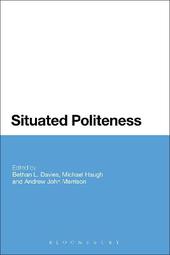
|
Situated Politeness
Paperback / softback
Main Details
| Title |
Situated Politeness
|
| Authors and Contributors |
Edited by Dr Bethan L. Davies
|
|
Edited by Michael Haugh
|
|
Edited by Andrew John Merrison
|
| Physical Properties |
| Format:Paperback / softback | | Pages:304 | | Dimensions(mm): Height 234,Width 156 |
|
| Category/Genre | Semantics |
|---|
| ISBN/Barcode |
9781623561307
|
| Classifications | Dewey:306.44 |
|---|
| Audience | | Professional & Vocational | |
|---|
|
Publishing Details |
| Publisher |
Bloomsbury Publishing Plc
|
| Imprint |
Bloomsbury Academic USA
|
| Publication Date |
22 November 2012 |
| Publication Country |
United States
|
Description
Pragmatic and sociolinguistic analyses of im/politeness have usually been dependent on context and cultural frames of reference. This new study approaches the concept from an original perspective, namely situatedness. Although politeness research often concentrates on examining how speeches or discourses themselves are situated with regards to different places and contexts, the focus on just one situation, and various text types within it, can also be of value. Situated Politeness is concerned with disentangling the factors which govern our behaviour within a given social context as well as across them. A range of expanding disciplines, including corpus linguistics, critical discourse analysis, and conversation analysis, are brought to bear on the topic, and this work will be of interest to a diverse global audience.
Author Biography
Michael Haugh is a Senior Lecturer in the School of Languages and Linguistics at Griffith University, Brisbane, Australia. Bethan L. Davies is a Lecturer on Linguistics and Phonetics at the University of Leeds, UK. Andrew John Merrison is a Lecturer in the English Language and Linguistics Department at York St. John University, UK.
ReviewsFor those interested in politeness - which surely includes most of us - this book is essential reading. Covering a range of theoretical approaches, settings, languages and cultures, Situated Politeness explores some of the key issues in current im/politeness research by some of the leading scholars in the field. The book adopts a new three-way division of politeness into institutional, interpersonal and public settings, including a variety of contexts and cultures, such as New Zealand workplaces, classrooms in Mexico a university hockey club in Sheffield, Japanese television drama, and a national advertising campaign in Australia. Particularly significant, Situated Politeness is primarily concerned not only with the local negotiation of both politeness and impoliteness but how these are, crucially, played out against a wider backdrop of social and cultural practices and beliefs. Not least, the style is highly accessible, and the various chapters offer a wide range of relevant and fascinating data. -- Sandra Harris, Professor Emeritus, School of Arts and Humanities, Nottingham Trent University, UK The idea is, as the editors point out, to disentangle the relationship between pragmatic meaning, social meaning and identity. They do not achieve a final solution (which may be impossible) nor do they steer clear of the complexities of this matter. On the contrary, by drawing on empirical research, the authors present different fine-grained theoretical tools and approaches that, undoubtedly, constitute an advance in this discipline... Very interesting and critically enlightening reading for a specialist who wants to be at the cutting edge of this discipline...Reading Situated Politeness allows for improvement in our comprehension of...complicated concepts. Combining this advancement with the variety of approaches covered in the volume make it an important step forward for the field of socio-pragmatics. -- Gonzalo Martinez-Camino, Universidad de Cantabria * Linguist *
|